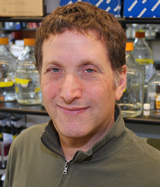NIH Funds Multicenter "Glue Grant" to Study Enzyme
NIH Funds Multicenter "Glue Grant" to Study Enzyme Function
May 21, 2010 — (BRONX, NY) — A multi-institutional team of researchers, including scientists at Albert Einstein College of Medicine of Yeshiva University, has received a prestigious National Institutes of Health (NIH) "Glue Grant" to develop a strategy for discovering the structure and function of unknown enzymes identified in genome-sequencing projects.

Steven C. Almo, Ph.D.The research could improve understanding of the metabolic and chemical diversity that exists in nature and may result in new drug targets for treatments. It may also lead to new enzymes that could prove useful for catalyzing industrial reactions. Over the next five years, the team will receive $33.9 million, of which Einstein will receive approximately $11 million.
Glue Grants, which are issued by the National Institute of General Medical Sciences (NIGMS), a division of the NIH, provide resources to tackle complex problems that are of central importance to biomedical science and beyond the means of any one research group.
In recent years, scientists have sequenced the genomes of thousands of organisms, from bacteria to humans, encompassing more than 10 million genes. But it’s not clear what many of these genes do or which proteins they code.
"The specific functions of perhaps half of these genes and the proteins they make are unknown or have been mistakenly characterized," says co-investigator Steven C. Almo, Ph.D., professor of biochemistry and of physiology & biophysics at Einstein. "The consortium will be working to close this gap."
"The knowledge from our EFI will give us a better sense of the breadth of enzymatic and metabolic activities that exist in nature. It will also further our understanding of disease and help us identify new targets for drug development."
-- Steven C. Almo, Ph.D.NIGMS currently funds a total of five such multicenter projects. This Glue Grant, known as the Enzyme Function Initiative (EFI), will focus on enzymes — proteins that catalyze the chemical reactions required for life and enable organisms to live in complex environments and to adapt to a variety of conditions.
"The knowledge gained from our EFI will give us a better sense of the breadth of enzymatic and metabolic activities that exist in nature," says Dr. Almo. "It will also further our understanding of disease and help us identify new targets for drug development."
The leader of the research team is John A. Gerlt, Ph.D., Gutgsell Chair and professor of biochemistry and of chemistry and biophysics at the University of Illinois at Urbana-Champaign. Dr. Gerlt and his colleagues have pioneered diverse techniques for more efficiently determining the function of an enzyme by defining its substrate — the molecule to which the enzyme docks to start a reaction. Their approaches involve both computational methods to narrow the substrate candidates and direct experimental screening of potential substrates.
For the EFI Glue Grant, Dr. Gerlt has assembled a team of researchers from several disciplines to discover the function of enzymes — an effort that begins with determining the structure of an enzyme of interest. The team will then use computers to create a short "hit list" of possible substrates that are most compatible with the structure of this enzyme. Next, scientists with expertise in particular enzyme superfamilies will evaluate the list to pinpoint the substrate, thereby providing direct insight into the enzyme’s function. Then, using a range of bacterial model systems, researchers will "knock out" the gene that codes for this enzyme. The manner in which the loss of this enzyme affects the organism will provide further information about the enzyme’s function.
Dr. Almo and his colleagues will be responsible for purifying the enzymes and then using x-ray crystallography to determine their molecular structure. (X-ray crystallography is a method that reveals the arrangement of atoms within a protein by striking the protein crystal with a beam of x-rays.) Dr. Almo’s team includes Ronald D. Seidel, Ph.D., associate in biochemistry and associate director of the Albert Einstein Macromolecular Therapeutics Development Facility.
In addition to the University of Illinois and Einstein, members of the EFI consortium include the University of Virginia, Texas A&M University, the University of Utah, Vanderbilt University School of Medicine, Boston University, and the University of New Mexico.
Other Top Stories
9/11 World Trade Center Exposure Linked to Heart Disease Among NYC Firefighters
On Becoming a Physician: New Einstein Students Receive White Coats and Stethoscopes
Novel Therapy for Acute Migraine Shows Promise in Phase 3 Clinical Trial
First Complete Wiring Diagram of an Animal's Nervous System
Multimillion Dollar NIH Grant to Help Reduce Opioid Use & Get Care to People Who Need It
NIH Grant Funds $23 Million Study of Diseases Affecting People Living with HIV
New TAILORx Data Guides Adjuvant Therapy in Younger Breast Cancer Patients
Einstein Celebrates Its 61st Commencement
Bolstering Biopsies: Testing Patients' Individual Cells to Guide Treatment



Tablet Blog